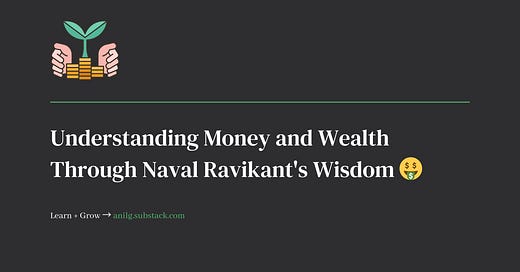Understanding Money and Wealth Through Naval Ravikant's Wisdom 🤑
Issue #78: My Favorite Money Quotes of Naval Ravikant. Book on Great Mental Models for Living. Comfort Zone → Growth Zone.
💡 Here are 3-tips to help you learn, grow, and be inspired this week!
🎓 Learn
This issue explores the deep and insightful views on money and wealth of Naval Ravikant, a well-known thinker and entrepreneur.
I have been reading and listening to his thoughts on life, work, and money for the last 4 years.
Unlike the usual advice on getting rich quickly, Naval's teachings focus on the long-term, meaningful paths to financial freedom and personal fulfillment.
Understanding these insights can transform how you view wealth, leading to more fulfilling and financially secure lives.
These quotes are not just about making money but about improving yourself and the world around you. By the end of this post, you'll have a new perspective on wealth and practical advice on how to apply these principles in your life.
#1 "The best way to become a billionaire is to help a billion people."
Naval suggests that true wealth comes from the value you provide to others, not just the money you make.
For example, if you create a product or service that solves a problem for many people, your success will naturally follow.
Think of entrepreneurs who've made significant impacts by focusing on solutions that benefit a large number of people.
#2 "The most important skill for getting rich is becoming a perpetual learner. You have to know how to learn anything you want to learn."
This quote emphasizes the importance of continuous learning and adaptability. Wealth creation is dynamic, and staying informed and skilled is key.
For instance, learning about digital marketing can open up numerous opportunities in today's online-driven economy, regardless of your current profession.
#3 "It’s not about how much you make, but how much you keep, how hard it works for you, and how many generations you keep it for.”
Naval highlights the importance of saving, investing wisely, and building generational wealth.
It's not just earning money but managing it smartly—like investing in stocks or real estate—that ensures long-term financial security for you and your family.
#4 "The real trick to having wealth is having more desires than what you need."
Naval suggests that to build wealth, one should harness their desires in a way that motivates creation and growth, not just to accumulate but to innovate and solve problems.
It's about channeling your wants beyond basic needs to drive ambition and progress.
For instance, if you desire to make a positive impact in your community, this ambition can lead to innovative business ideas or solutions that, in turn, generate wealth.
#5 "Earn with your mind, not your time."
Instead of trading hours for dollars, Naval encourages finding ways to make your knowledge and creativity generate income.
This could mean creating a course based on your expertise or writing a book. This approach leverages your unique skills and insights for income rather than the finite time you can work.
Key Takeaway:
By focusing on providing value, continuous learning, wise financial management, contentment, and leveraging your intellect, you can achieve true wealth. Remember, it's a journey of personal growth as much as it is about accumulating wealth.
Here are a (few more) of my favorite quotes on money from the Naval:
"Money will solve all problems that not having money creates."
"A fit body, a calm mind, a house full of love. These things cannot be bought – they must be earned.”
"Money is how we transfer time and wealth."
"Seek wealth, not money or status. Wealth is having assets that earn while you sleep."
"Learn to sell. Learn to build. If you can do both, you will be unstoppable."
"You get rich by owning things over time."
"All the real benefits in life come from compound interest."
You can learn much about life, money, and happiness from his tweets and book.
🚀 Growth Tip
In this book (I read last year), Suneel talks about a few great mental models for success and joy based on Eastern spiritual wisdom.
My favorite mental models from this book are:
Map and Compass, on goal settings.
Micro Contracts.
One-way door vs two-way doors.
Full disclosure: Author Suneel Gupta and I are not related 😁
🤩 Inspiration
I found this post on LinkedIn a few weeks ago, which explains the transformation from Comfort Zone → Growth Zone.
I would encourage you to find out which zone you are currently operating in and how you can transition to a Learning or Growth Zone.
[On a different note, here’s something I’m excited to share to help you boost your productivity and performance through better writing in 2025]
How Samir, an Engineer, Transformed His Career with One Skill
Samir wasn’t a writer. He was a software engineer, great at building things but struggled when it came to explaining ideas, pitching projects, or sharing updates.
After being passed over for a promotion, he realized something: It wasn’t his technical skills holding him back—it was his writing.
He signed up for a copywriting course, thinking it would help him write better emails. (It did that and more.)
In a few months, Samir’s emails were clear and persuasive. His project proposals got approved faster. He became the go-to person for internal presentations. And, yes—he finally got that promotion.
Why? Because writing is a meta-skill.
Whether you’re an engineer, designer, accountant, or manager, writing impacts everything. Emails, reports, pitches, presentations—good writing makes you more productive, more effective, and more valuable.
Here’s the good news: WRITING IS A SKILL. You don’t “have it”, you learn it.
If you can improve only one skill in 2025, make it writing.
I’ve spent over $5,000 on different writing courses, and out of all of them, I highly recommend CopyThat—an email-based copywriting course you can complete in just 30 minutes a day for 10 days.
✍🏻 Check it out here: CopyThat
PS: Enjoy the Learn + Grow? Please forward this to a friend. It only takes 18 seconds. Writing this one took 3 hours. And if you want to continue learning and growing, I would suggest subscribing and listening to my podcast, Peaceful Growth. It’s free, just like this newsletter.
May the Peaceful Growth be with you! 🪴







Thanks for sharing this insightful articles :)